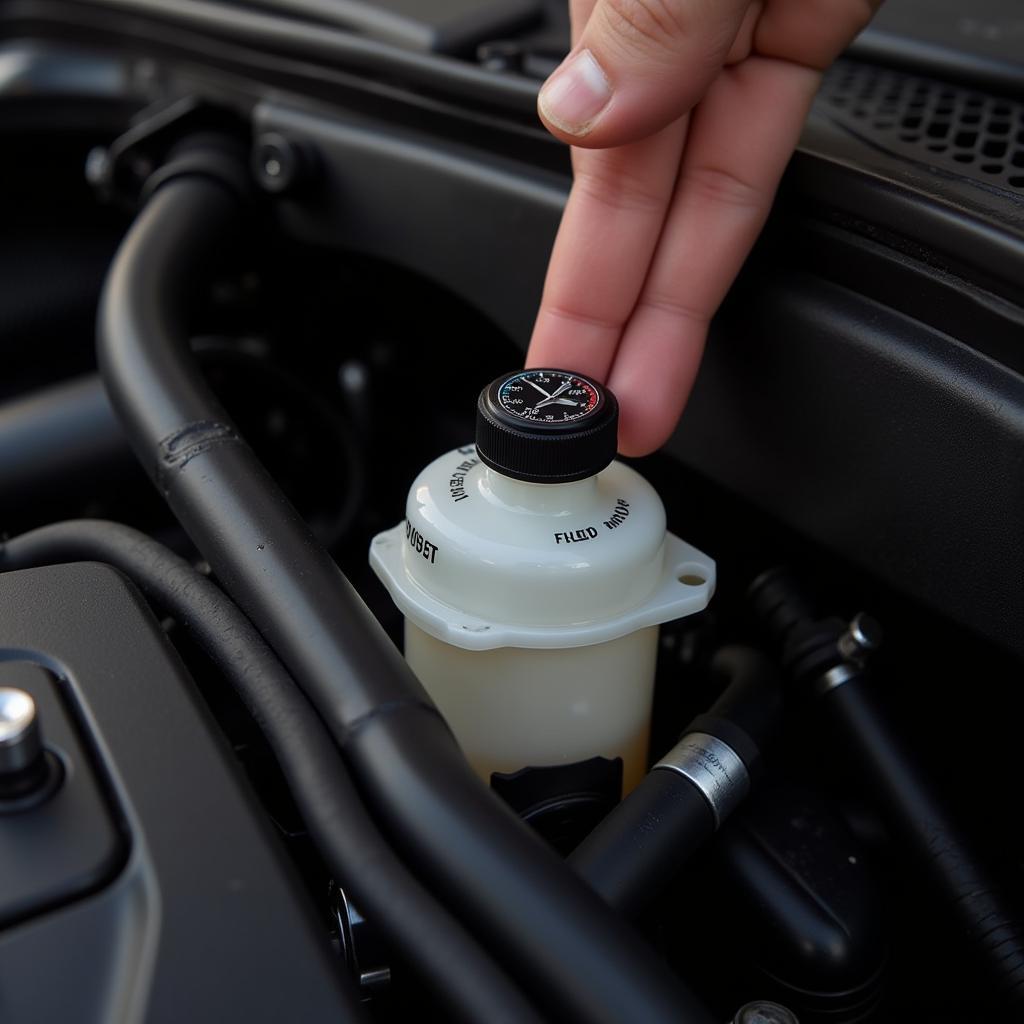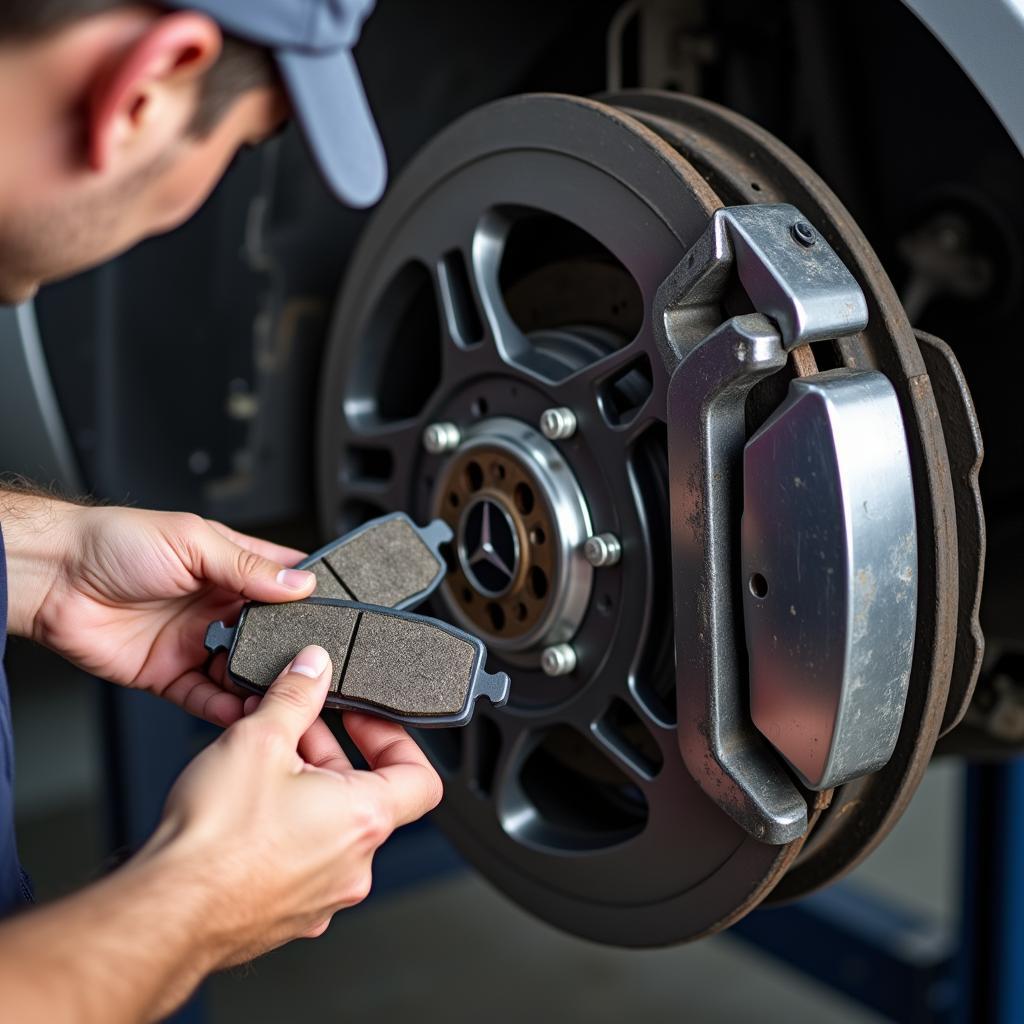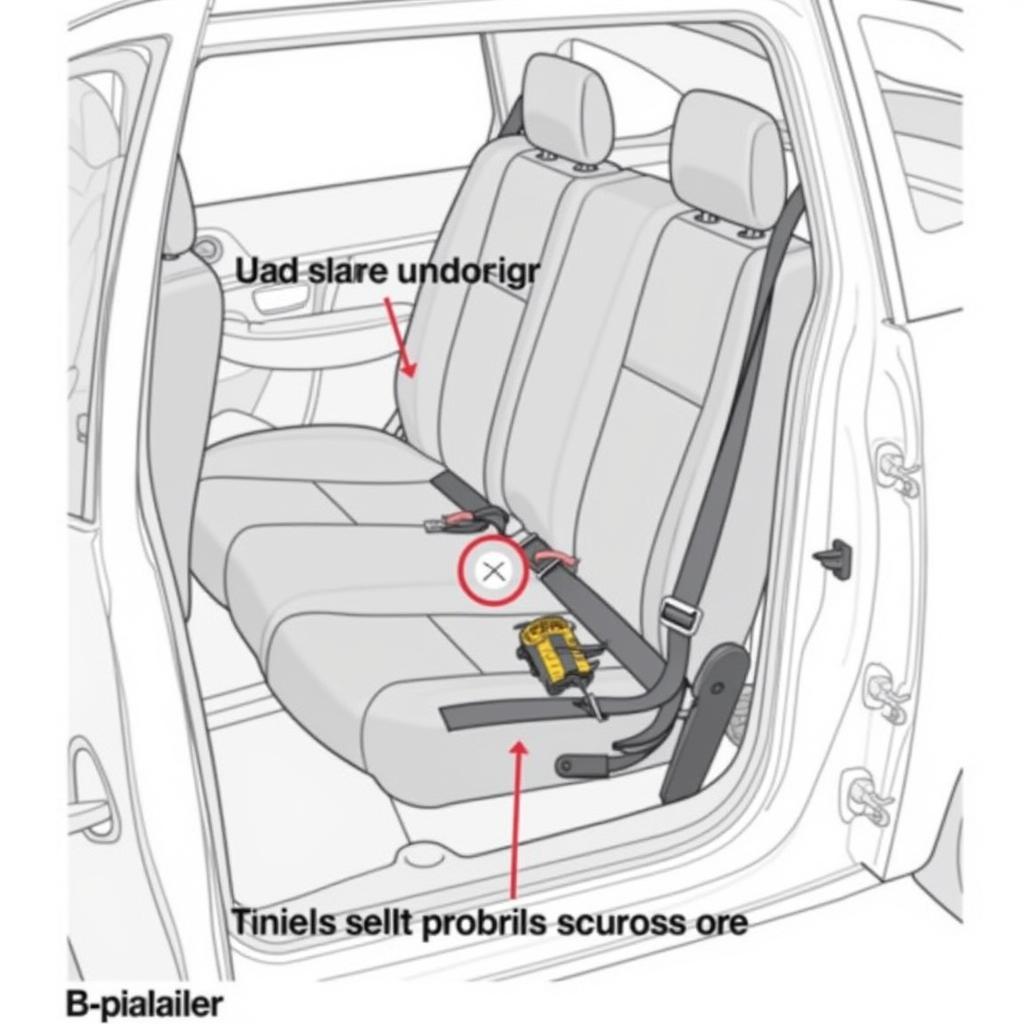The dreaded red “STOP” brake warning light illuminated on your 2003 E320 Mercedes dashboard, accompanied by the ESP light – a sight that can induce panic in any driver. This alarming combination signals a potential malfunction within your car’s vital braking and stability control systems, demanding immediate attention.
This comprehensive guide will delve into the common culprits behind the 2003 E320 Mercedes ESP red “STOP” brake warning light, equipping you with the knowledge to diagnose and potentially resolve the issue.
Understanding the Warning Lights
Before we dive into the specifics, let’s clarify what each warning light signifies:
- Red “STOP” Brake Warning Light: This light indicates a critical issue with your braking system. It could be due to low brake fluid, a serious brake system malfunction, or an issue with the brake wear sensors.
- ESP Light: The Electronic Stability Program (ESP) light indicates a problem with your vehicle’s stability control system, which works in tandem with the braking system to maintain traction and prevent skidding.
When both lights illuminate simultaneously, it suggests a potential interconnection between the two systems.
Common Causes of the Warning Lights
Here are the most frequent culprits behind the 2003 E320 Mercedes ESP and red brake warning lights:
- Low Brake Fluid: This is the most common and straightforward cause. Brake fluid is the lifeblood of your braking system, and a low level can significantly compromise braking performance.
- Solution: Check your brake fluid reservoir level. If it’s low, carefully top it up with the recommended brake fluid type. However, simply adding fluid won’t fix a leak, so it’s crucial to have the system inspected for leaks.
- Worn Brake Pads: Your brake pads are designed to wear down over time. When they reach a certain thickness, a sensor triggers the warning light.
- Solution: Inspect your brake pads for wear. If they appear thin or worn, replace them. It’s recommended to replace all four brake pads simultaneously for even braking performance.
- Faulty Brake Pad Wear Sensor: Sometimes, the sensor itself can malfunction, triggering the warning light prematurely.
- Solution: Check the brake pad wear sensors for damage or corrosion. If faulty, replace the sensor.
- Brake Fluid Leak: A leak in your brake lines, calipers, or master cylinder can lead to a significant drop in brake fluid pressure, triggering the warning lights.
- Solution: Thoroughly inspect your brake system for any signs of leaks, such as fluid puddles beneath your car or dampness around the brake components. Address any leaks immediately by repairing or replacing the affected parts.
- Faulty ESP Sensor: The ESP system relies on various sensors to function correctly. A malfunctioning wheel speed sensor, steering angle sensor, or yaw rate sensor can trigger the ESP light and potentially affect braking performance.
- Solution: Diagnosing a faulty ESP sensor requires specialized equipment. It’s recommended to take your vehicle to a qualified Mercedes-Benz technician for diagnosis and repair.
- Issues with the ABS Control Module: Though less common, a malfunctioning ABS (Anti-lock Braking System) control module can also trigger the warning lights. This module plays a crucial role in regulating brake pressure and stability control.
- Solution: Similar to ESP sensor issues, diagnosing and repairing an ABS control module requires specialized knowledge and tools. Consult a qualified Mercedes-Benz technician for assistance.
 Checking Brake Fluid Reservoir
Checking Brake Fluid Reservoir
What to Do When the Warning Lights Appear
The illumination of the red “STOP” brake warning light, especially in conjunction with the ESP light, demands immediate action:
- Safely Pull Over: As soon as it’s safe, gently pull over to the side of the road. Continuing to drive with potentially compromised brakes poses a serious safety risk.
- Assess the Situation: Check your brake fluid level. If it’s dangerously low or you see signs of a leak, do not attempt to drive further.
- Seek Professional Help: If you’re unable to identify the cause or are uncomfortable troubleshooting brake-related issues, it’s crucial to have your vehicle towed to a qualified Mercedes-Benz mechanic or dealership for a thorough inspection.
 Inspecting Mercedes-Benz Brake Pads
Inspecting Mercedes-Benz Brake Pads
Preventative Maintenance: Keeping Your Mercedes-Benz Safe
Prevention is always better than cure, especially when it comes to safety-critical systems like your brakes:
- Regular Brake Fluid Checks: Inspect your brake fluid level at least once a month and top it up as needed.
- Timely Brake Pad Replacement: Don’t wait for the warning lights to illuminate. Consult your owner’s manual for recommended brake pad replacement intervals.
- Annual Brake System Inspection: Schedule a comprehensive brake system inspection with a qualified Mercedes-Benz technician at least once a year.
mercedes benz brake wear warning light
Conclusion
The appearance of the red “STOP” brake warning light and the ESP light on your 2003 E320 Mercedes is a clear indication of a potential problem that should never be ignored. While some causes, like low brake fluid, can be relatively simple to address, others necessitate the expertise of a qualified technician.
Remember, your safety and the safety of others on the road is paramount. Regular maintenance, prompt attention to warning lights, and professional assistance when needed are the keys to keeping your Mercedes-Benz running smoothly and safely for miles to come.
Frequently Asked Questions
1. Can I drive my 2003 E320 Mercedes with the ESP light on?
It’s not recommended to drive with the ESP light on, as it indicates a potential issue with your vehicle’s stability control system. While you might still have braking capability, you could be at an increased risk of skidding or losing control, especially in adverse conditions.
2. How often should I replace my Mercedes-Benz’s brake fluid?
Mercedes-Benz generally recommends replacing your brake fluid every 2 years or 20,000 miles, whichever comes first.
3. Why is my ESP light on after a car wash?
Sometimes, water can splash onto ESP sensors during a car wash, causing temporary malfunctions. In such cases, the light usually disappears after the sensors dry. However, if the light persists, it’s best to have it checked.
2003 mercedes e320 brake warning light
4. Can a low battery cause the ESP light to come on?
While unlikely, a severely low battery can sometimes disrupt the function of electronic systems, including the ESP. If your battery is low, charging it might resolve the issue.
5. How much does it cost to fix an ESP problem in a 2003 E320 Mercedes?
The cost of repairing an ESP issue can vary greatly depending on the underlying cause. A faulty sensor might be relatively inexpensive to replace, while a malfunctioning ABS control module could be significantly more costly. It’s always recommended to get a quote from a trusted mechanic before proceeding with any repairs.

